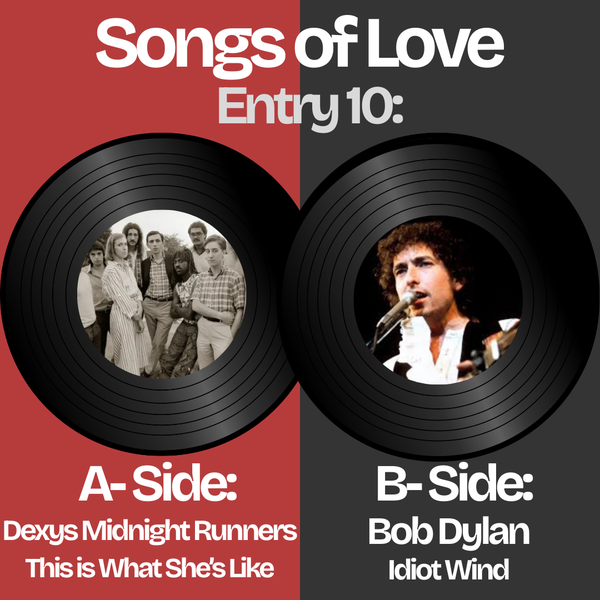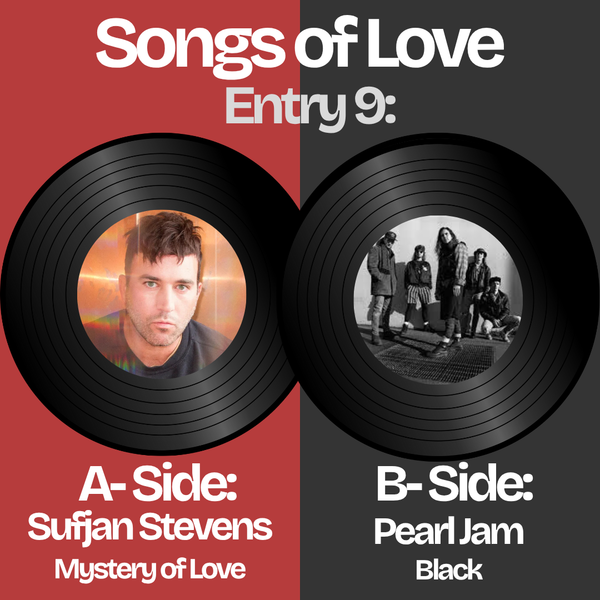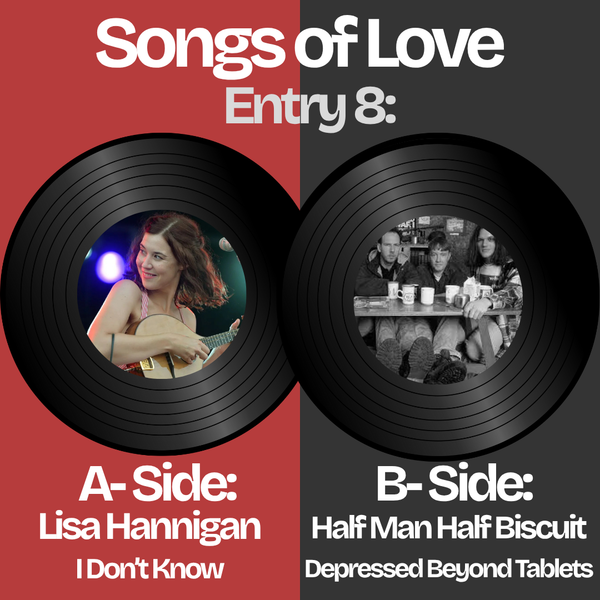Songs of Love 2
Two songs here from bands often grouped under the nebulous and occasionally suspect label of “classic rock.” Two bands, moreover and indeed relatedly, who are not typically known for extremes of emotion, or even particularly for love songs (with a few exceptions). The A-side is an album track, and not from one of the band’s better-known albums, but the B-side is a hit single, albeit not a well remembered one, and one which featured on the first volume of the band in question’s Greatest Hits, the liner notes to which describe it as representing “an emotional side to Queen not often heard by singles buyers.” In fact, both of these songs reflect a mode in which I think both bands were actually quite accomplished. Two songs written entirely by guitarists, incidentally, which has no real relevance to anything, but is a fun coincidence given that neither was the main vocalist of the group (though one was the main songwriter and does in fact sing this song).
Performed by The Who [Strictly speaking, only Townshend performs on this track, but it’s released under the group name]
Written by Pete Townshend
Released 1967
The sublime is, briefly, a sense of overwhelming awe and wonder, often engendered by natural phenomena – mountains, storms etc. It’s an intermingling of pleasure and terror, found in a lot of Romantic art. And while we think of sunrise as a time of peace and serenity, it’s not hard to see how it could be apprehended as sublime – breath-taking, in fact. Our nearest star, a cosmic entity of a size difficult for human minds to comprehend, comes into view every morning as the planet rotates beneath us, bringing us into its view for a matter of hours so that it can bring life to the planet. It’s not hard to see why sun gods are nigh-on universal. It’s so powerful we can’t even look at it – it doesn’t get much more sublime than that.
Except that here, it does. Because the sunrise is as nothing compared to the singer’s lover.
It’s quite a claim, when you really examine it in the most literal way (which is, of course, the best way to deal with all art). Here’s the source of all life on earth creeping over the horizon, beginning its diurnal course across the firmament to an equally famously beautiful sight this evening – but really it’s nothing, “drab” compared to this person. How does someone come to make an absurd claim like that?
Well, it’s love, isn’t it? And poetry, in a broad sense – both prone to hyperbole, shall we say. But both also prone to close attention. The best poetry, the best literature, is precise; it redefines the world through careful observation. And love is much the same – every detail of the beloved’s face, voice, mannerisms; all kept safe in a great vault. Whether it be Shakespeare’s mistress’s eyes (themselves not to be compared to the sun, as he’s happy to admit), Sappho’s lover’s lips, or various parts of Solomon’s lover’s body, they become themselves the stuff of poetry. As wild as the claims of love and poetry may be on the most material level, we should take them very seriously indeed, because they have a truth all of their own.
But there’s more to the lover in this song than just their eclipsing beauty. Many a song has the lover present, tactile, able to be interacted with. Many others have them at a distance, the source of longing, envy or spite. This one manages to do both; the lover is somehow both present and absent. They are an “echoed vision,” [1] a haunting presence that won’t leave the singer – worse, that undermines their everyday life, causing them to spiral, to confront the realities of their life. There’s a hint here that it’s this very obsession (“my eyes see only you”) that has undermined the singer’s life – that they’re somehow imprisoned by the lover. That’s why they’re so forlorn, why the arrangement is so bare – they feel alone, exposed.
And all of this despite the fact that every day they “turn down love,” which seems a peculiar sentiment in the midst of this meditation on the lover’s beauty and its overwhelming power. A few possibilities suggest themselves here: the first is that the singer is, for whatever reason, refusing the lover – perhaps because this distance, this haunting presence, is more comfortable than opening themselves up to an actual relationship would be. Another is that this is an attempt to free themselves from this obsession in order to function on a daily basis; that they need to “turn down” the volume on it, with the sunrise encounter, such as it is, acting as a sort of release valve – like sunrise, the implication is, this encounter happens but once per day.
A third suggests itself by examining the context. The line “and then again I’ll turn down love” occurs four times in the song. Three of those times it’s succeeded by “having seen you again,” and once by “remembering your smile.” So there’s a necessary link between the lover’s presence, whether actual or remembered, and the refusal of love. So perhaps the love that’s being refused is not that of the ethereal beauty we’ve been hearing about, but of someone else. The singer is (repeatedly) passing up the opportunity for a mundane relationship in favour of their obsession with someone who is mysteriously absent, perhaps imagined, almost certainly idealised.
And so, as so often seems to happen, scratch the surface of a song about devotion, and it turns out to be about obsession and the unreal. But this doesn’t diminish its power, or even its applicability to real loves and relationships. ‘Sunrise’ is about choosing the ethereal, the ideal, over the real, and basking in that. And while that’s potentially a disastrous road, it’s hard to deny that it’s a tempting one.
[1] For a long time, I misheard this line as “an ecovation of you,” as if Townshend had misremembered or mispronounced the word “evocation,” which I think speaks to what an odd phrase this is. It’s a lovely bit of synaesthesia, and it sticks in the memory (once you find out what it actually is).
Performed by Queen
Written by Brian May
Released 1980
This song dramatizes what’s left in the wake of a failed relationship; the sensation of being bereft, abandoned, exposed. Naked, rather than nude: unprotected. Naked feelings, the naked truth. Lacking in motivation to do just about anything. And it’s this lack of motivation and of protection that leaves the singer stranded between contradictory impulses, which intertwine throughout the song, each fighting its way to the surface, pushing the other down into the depths.
The first of these impulses is the one suggested by the title: the return of the former lover. Any moment now, they’ll come through the door, and it’ll all be forgotten; the two of them will return to being a perfect pair, and the singer will return home. It’s a fantasy that the singer can’t quite bring themself to believe, telling themself that it’s all lies, that there was never anything genuine at the heart of the relationship. This is as much a distortion as the fantasy of the lover’s return, but in the untrammelled excess of the post-break-up tempest, anything goes.
The other impulse is perhaps a healthier one – certainly one that looks to the future rather than the past. The singer will move on, find a new lover and continue forwards into the rest of their life. Yet to call this an “impulse” is perhaps going too far. Rather, it’s regarded as an inevitability, as something that will come to pass. The singer can’t even contemplate expending any energy on it, having none presently to spare. The way it’s described – “advertis[ing]/A soul for sale or rent” – is far from romantic. It’s a neat image in the way it suggests love as either permanent or temporary, but of course it’s also commercial. The singer has been reduced to a piece of property to be bid on.
What’s more, this course of (in)action has just as distorted a relationship with time as the other. The first is a retreat into melancholy which erases the future in pursuit of an imagined past glory. But the second is a hurtling into the future without regard to the past, a definitive erasure in the belief that the time and love given to the former partner were “wasted.” Both are an escape from the present moment, which is suspended in stasis between the two.
Ultimately, the listener may suspect they know which course will win, just as the singer does. But that doesn’t deprive the declaration that “I love you ‘til I die,” the last word rhyming with “lie” both times it occurs in the song, of power. Rather, it’s an expression of the emotion of the moment – consumed by memory, unable to act, hoping only to be acted upon. The belief that the entire relationship was premised on falsehood is simultaneously comforting and an act of self-torture, as is the confident declaration of everlasting love. This is a song of a very particular moment, and all the more powerful for that.



